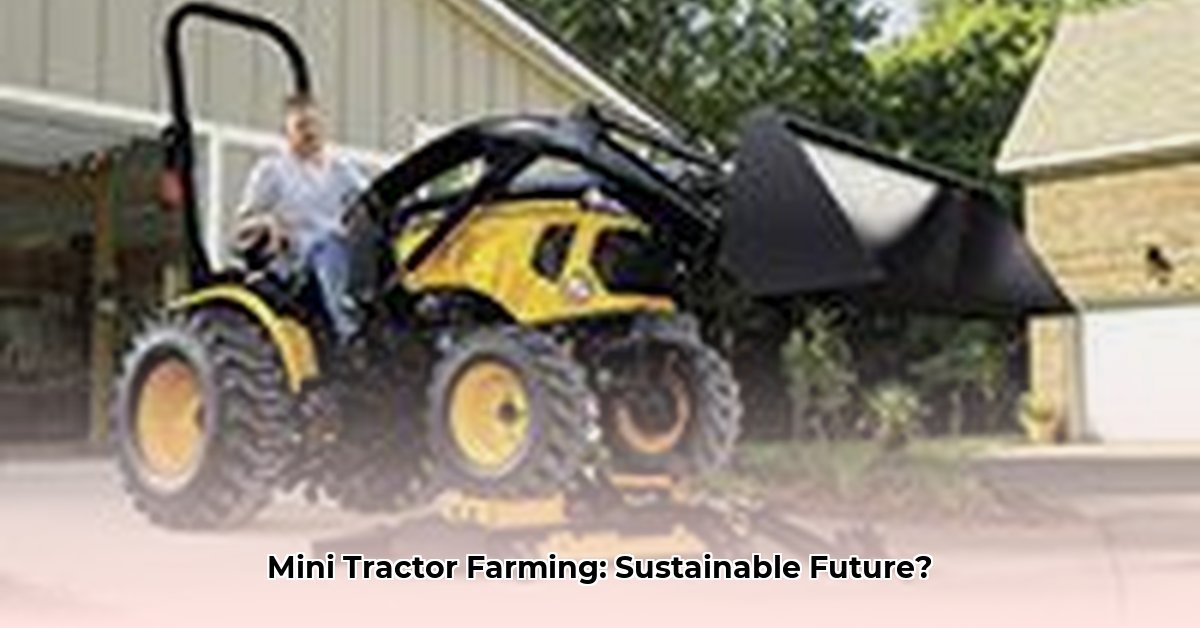
Thinking about sustainable agriculture but on a budget? Compact tractors like the Cub Cadet 6284 offer an intriguing option. This in-depth review goes beyond a superficial assessment, analyzing its suitability for modern, eco-conscious farming practices. We'll examine its performance, maintenance needs, environmental impact, and cost-effectiveness, empowering you to make an informed decision. For more parts information, check out this helpful resource: Cub Cadet Parts.
Detailed Specifications and Features
The Cub Cadet 6284, typically manufactured between 2005 and 2015, is a compact tractor with a robust 28-horsepower, three-cylinder diesel engine. Its hydrostatic transmission provides smooth, precise speed control, crucial for navigating tight spaces and delicate tasks common in sustainable farming. A powerful PTO (power take-off) system allows for attachment versatility, expanding its capabilities throughout the growing season.
Key Features:
| Feature | Specification | Notes |
|---|---|---|
| Engine | 28 hp, 1.1L three-cylinder diesel | Proven reliability, but age may affect efficiency and emissions. |
| Transmission | Hydrostatic | Precise speed and direction control; ideal for various operations. |
| PTO Power | (To be determined from further research) | Determines compatible implements. |
| Hydraulic Capacity | (To be determined from further research) | Impacts the size and weight of operable attachments. |
| Typical Attachments | Mower deck, tiller, loader, box scraper, etc. | Attachment availability varies; check local markets. |
Performance Analysis: Real-World Applications & Fuel Efficiency
Imagine effortlessly tilling a small vegetable plot, smoothly mowing orchard perimeters, or hauling small loads—all within a single workday using the Cub Cadet 6284's hydrostatic transmission for precise control. Its compact size makes it ideal for small-scale operations where larger tractors would be cumbersome and fuel-intensive. While precise fuel consumption figures require specific testing, anecdotal evidence from owners suggests surprisingly low fuel usage for light to moderate tasks on relatively flat terrain. However, its age might mean lower fuel efficiency compared to newer, more technologically advanced compact tractors, a crucial factor in sustainable farming's cost-effectiveness. How does its fuel efficiency compare to both larger tractors and modern compact models? Further research is needed to quantify this effectively.
Maintenance & Repair: A Realistic Perspective
Owning an older tractor necessitates proactive maintenance. While the Cub Cadet 6284 is durable, parts sourcing may be more challenging than for newer models, potentially impacting repair costs. Regular maintenance is paramount.
Essential Maintenance Steps:
- Regular Oil Changes: Use the recommended oil grade for optimal engine performance.
- Fluid Level Checks: Regularly check hydraulic, coolant, and transmission fluid levels.
- Belt & Hose Inspections: Inspect belts and hoses for wear; replace damaged components promptly.
- Tire Pressure Monitoring: Correct tire pressure ensures optimal traction and fuel efficiency.
- Regular Cleaning: Cleaning prevents corrosion and facilitates early detection of potential problems.
- Lubrication: Lubricate moving parts as per the manufacturer's recommendations.
- Annual Professional Inspection: A yearly inspection by a qualified mechanic is strongly recommended.
Environmental Impact: Sustainability Considerations
The Cub Cadet 6284's diesel engine, while relatively fuel-efficient for its size, does not meet modern emission standards. This is a significant consideration for environmentally conscious farmers. Newer tractors offer improved fuel efficiency and reduced emissions. Although its compact size minimizes soil compaction compared to larger tractors, improper use (e.g., operating on wet soil with heavy implements) can still negatively impact soil health. This points to the critical need for responsible usage. Further research comparing its emissions to newer models would significantly strengthen a sustainability assessment.
Cost-Benefit Analysis: Weighing the Investment
The initial cost of a used Cub Cadet 6284 is generally lower than that of a new compact tractor. However, potential maintenance and repair costs must be factored in. Comparing its lifecycle cost—including fuel, parts, and labor—to that of newer, more fuel-efficient models is essential. While a new tractor represents a larger upfront investment, long-term fuel savings and reduced maintenance might justify the initial expense. This careful cost-benefit analysis is crucial for making informed purchasing decisions.
Conclusion: Making an Informed Choice
The Cub Cadet 6284’s suitability for your sustainable farming operation depends on a careful assessment of its strengths and weaknesses. Its affordability and compact size are advantageous for small-scale farming. However, the challenges of parts sourcing, potential repair costs, and its older engine's emissions should be thoroughly considered. By conducting comprehensive research, budgeting realistically, and focusing on long-term implications, you can make a confident, informed choice. Remember, even older equipment can contribute to a thriving and sustainable farm operation with proper care and maintenance.